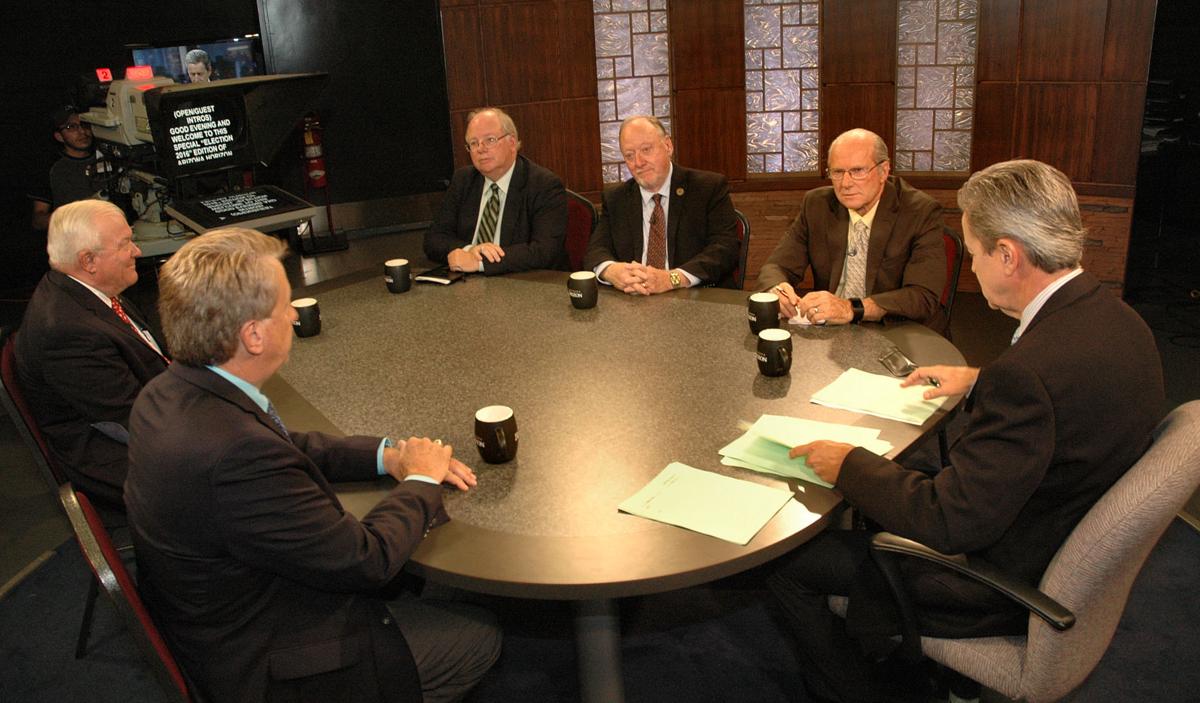PHOENIX — Four of the five Republican candidates for Arizona Corporation Commission said at a debate they’re not convinced that human activity contributes to climate change.
“I don’t see the evidence of it,” said Rick Gray in the live televised debate Monday night. “Where are the facts?”
Host Ted Simons of KAET asked Gray if he was discounting what’s been said by many scientists.
“I’m just saying we have not seen all the evidence,” Gray responded.
“I don’t think it’s been proven absolutely for me,” said former judge Boyd Dunn. He said it’s a good thing that Arizona, unlike some other states, has a diversity of power sources, including coal.
Former state Sen. Al Melvin said there’s been climate change “since the beginning of time and I would suppose that is the situation as opposed to man-made problems.” He also took a slap at the Obama administration’s policies, saying the move to shut coal-fired plants is political.
Current commissioner Bob Burns also expressed skepticism of human-caused climate change.
“I have a hard time believing that when you can have a volcano go off and create more pollution than we can deal with for who knows how long,” he said.
Only Andy Tobin, also on the commission, said it would be foolish to believe that humans are not affecting climate.
“It’s hard to argue that all the asphalt that humans have put down in the city of Phoenix hasn’t done something to increase the heat here,” Tobin said. And the same is true, he said, of other activities, including greenhouse gases.
“We’re burning these things so I do think it’s impactful,” Tobin said. “The question is, to what extent?”
Their views are significant because commissioners have purview over regulations that now require utilities to obtain at least 15 percent of their power from alternate “clean” sources like solar, wind and geothermal by 2025. The commission can not only increase or decrease that mandate but also is deciding what costs utilities can impose on homeowners who install rooftop solar.
Only three of the contenders will advance to the general election, where they will face Democrats Bill Mundell and Tom Chabin.
As anticipated, the debate provoked some fireworks over the ongoing contention by Burns that Arizona Public Service secretly helped finance independent campaigns that spend $3.2 million in 2014 to elect Republicans Tom Forese and Doug Little. APS has declined to confirm or deny it was the source of such money.
Among this year’s candidates, Burns is alone in wanting new rules to require utilities to disclose their political spending. He said he’s the only one looking for “transparency.”
But Burns found himself under attack for his decision last week to hire an attorney, at public expense, to take a closer look at the influences affecting the commission’s decisions, including political donations.
Gray said there is no evidence that the votes of either Forese or Little have been affected by that outside spending.
Gray charged that Burns is trying to make up for his lack of funds by making an issue out of APS’s possible spending. Now, he said, that includes a contract to pay a lawyer up to $95,000 to poke around, “which gives him (free) press.”
“There’s just an obvious questionable appearance,” Gray said.
Burns shot back, “This just didn’t come up before the election started. I’ve been working on this for almost two years. This cloud has been hanging over this commission for at least two years.”
“You created the cloud,” Gray interjected.
“No, APS created this cloud,” Burns responded.
Tobin, who opposes Burns’ efforts to force utilities to disclose political donations, questioned why all the attention now on a 2-year-old race.
“So they’re guilty,” he said as a hypothetical. “What do you want to do about it?”
It remains to be seen whether the other commissioners will try to overturn or modify Burns’ decision to hire the attorney, which was approved by Jodi Jerich, the commission’s executive director.
Gray also criticized Burns for his complaints about spending by anonymous donors. He pointed out that Burns is the beneficiary of some outside spending this year.
But the “robocalls” and mailers for Burns have disclosed their dollars are coming from SolarCity, which is engaged in an ongoing battle with several utilities over how much the commission will force their customers to pay to the power companies. By contrast, the two groups that spent money in 2014 on behalf of Forese and Little have pointedly refused to disclose the source of their dollars, saying they are organized as “social welfare” organizations exempt from state campaign finance laws.
Former Republican Commissioner Kris Mayes, who did the robocall for Burns, said there was a “deliberate decision” to be transparent on the source of the funds.
Candidates have no control over independent outside expenditures. But Burns said he has publicly asked other groups not to provide such help.
Gray, Melvin and Tobin are running as a team for the three available seats.





